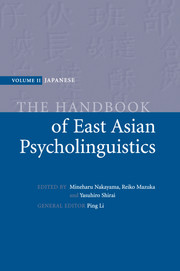Book contents
- Frontmatter
- Contents
- List of figures
- List of contributors
- In memory of Miwa Nishimura
- Preface
- Introduction
- Language acquisition
- 1 Ontogeny of language
- 2 Caregivers' speech
- 3 The intrinsic link between gesture and speech at the prelinguistic stage
- 4 Infant speech perception
- 5 Phonological acquisition
- 6 The mechanism of lexical development: implications from Japanese children's word learning
- 7 The acquisition of nouns and verbs in Japanese
- 8 The acquisition of verbal nouns
- 9 The acquisition of Japanese numeral classifiers
- 10 The acquisition of case markers
- 11 The acquisition of tense and aspect
- 12 On the origin of children's errors: the case of Japanese negation and direct passive
- 13 Binding Theory in UG and first-language acquisition of Japanese
- 14 The acquisition of the particles ne, yo, and no
- 15 The acquisition of linguistic politeness in Japanese
- 16 Children's narrative structures
- 17 Memory talk and testimony in children
- 18 Developmental dyslexia
- 19 Japanese Sign Language
- 20 The role of an innate acquisition device in second-language acquisition
- 21 Japanese, the grammar of reflexives, and second-language acquisition
- 22 Processes in L2 Japanese sentence production
- 23 The development of lexical competence among second-language readers
- 24 Reading in Japanese as a second language
- 25 Intrasentential code-switching in Japanese and English
- Part II Language processing
- References
- Name index
- Subject index
21 - Japanese, the grammar of reflexives, and second-language acquisition
from Language acquisition
Published online by Cambridge University Press: 05 June 2012
- Frontmatter
- Contents
- List of figures
- List of contributors
- In memory of Miwa Nishimura
- Preface
- Introduction
- Language acquisition
- 1 Ontogeny of language
- 2 Caregivers' speech
- 3 The intrinsic link between gesture and speech at the prelinguistic stage
- 4 Infant speech perception
- 5 Phonological acquisition
- 6 The mechanism of lexical development: implications from Japanese children's word learning
- 7 The acquisition of nouns and verbs in Japanese
- 8 The acquisition of verbal nouns
- 9 The acquisition of Japanese numeral classifiers
- 10 The acquisition of case markers
- 11 The acquisition of tense and aspect
- 12 On the origin of children's errors: the case of Japanese negation and direct passive
- 13 Binding Theory in UG and first-language acquisition of Japanese
- 14 The acquisition of the particles ne, yo, and no
- 15 The acquisition of linguistic politeness in Japanese
- 16 Children's narrative structures
- 17 Memory talk and testimony in children
- 18 Developmental dyslexia
- 19 Japanese Sign Language
- 20 The role of an innate acquisition device in second-language acquisition
- 21 Japanese, the grammar of reflexives, and second-language acquisition
- 22 Processes in L2 Japanese sentence production
- 23 The development of lexical competence among second-language readers
- 24 Reading in Japanese as a second language
- 25 Intrasentential code-switching in Japanese and English
- Part II Language processing
- References
- Name index
- Subject index
Summary
Overview
This chapter reviews research since the mid 1980s on the acquisition of reflexives (especially zibun) by L2 learners of Japanese. A first wave of generative-inspired work assumed parameterization of the binding principles. Empirical studies indicated that L2 learners' grammars are largely consistent with Universal Grammar-based constraints on crosslinguistic variation in the grammar of reflexives. Subsequent research abandoned parameterization in favor of raising reflexives in LF. Studies in this vein produced equivocal results, despite benefiting from methodological advances and a well-articulated research hypothesis about L2 learners' knowledge of zibun. Recent work has explored child L2 acquisition of zibun, and whether L2 learners control relevant pragmatic and discourse-based constraints.
I begin with some background on each of the three topics that converge in this research: Japanese, reflexives, and L2 acquisition.
Japanese
While a strong tradition of generative analyses of Japanese has been sustained since Kuroda (1965), there also exists a long-standing commitment to functional linguistics (e.g. Kuno, 1987). Sometimes generative formalism is viewed as complementing functionalism, sometimes as competing with it. Both approaches are in evidence in research on L2 acquisition of Japanese reflexives.
It also is worth mentioning that within western linguistics Japanese is often taken as emblematic of “otherness,” reinforcing native speakers' investment in a deep-rooted “myth” (Miller, 1977) of the uniqueness of the language. One can only speculate about the extent to which a predisposition to magnify the distinctiveness of Japanese has influenced linguistic analysis.
- Type
- Chapter
- Information
- The Handbook of East Asian Psycholinguistics , pp. 151 - 157Publisher: Cambridge University PressPrint publication year: 2006

